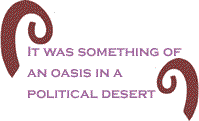It
was unlike any political experience I have had. The extent
of the racial/ethnic diversity; the preponderance of people
under 35; the gender balance; the international guests;
the broad range of progressive social and political organizations;
this and much more were in evidence for all to see at the
phenomenal US Social Forum (USSF). The gathering, from June
22 - 26 in Detroit was the second such
gathering in the USA,
inspired by the World Social Forum movement that commenced
in Brazil in 2001 (the first US Social Forum was held
in Atlanta in June
2007). I forgot to mention, there were somewhere between
15,000 - 20,000 attendees!

The
US Social Forum was the product of an immense amount of
work on the part of a planning committee that drew from
a variety of organizations and movements, with one particular
network, Grassroots Global Justice, playing a very central
role in moving the process. One of the striking features
of the USSF was that the political diversity did not result
in sectarian behavior. People who, outside of the USSF context,
are often at odds, found a safe meeting place, and actually
more than that: a place where fruitful exchanges could take
place.
Yet
in walking through the conference - which in many ways was
multiple conferences, given the hundreds of workshops and
plenaries - what struck me the most was that this was the
antithesis of the Tea Party movement. Instead of the fear,
ignorance and hatred emanating from the Tea Party crowd,
there was a sense of optimism - yes, optimism - from the
gathering, mixed with an urgency to defend and change planet
Earth before it is too late. This was remarkable given that
the gathering was, as mentioned, so diverse and there was
no consensus as to what is the specific, progressive alternative
to the madness of global capitalism. That said, the slogan
of the conference, “Another World is Possible,” truly defined
the nature of this assembly. It did so in some very fundamental
ways, most especially, the recognition that actually existing
capitalism is in the process of destroying the planet, what
with environmental degradation and the exploitation of working
people in order to achieve grand profits. It was also an
accurate slogan in that there are social movements and some
countries around the world that are taking the lead in experimenting
with everything from alternative economies to revolutionary
approaches toward the environment.  Actually
existing capitalism, then, is not the only possible reality;
it is the reality to which most of us have become accustomed. Actually
existing capitalism, then, is not the only possible reality;
it is the reality to which most of us have become accustomed.
The
diversity of the USSF, at the same time, presents certain
challenges. Though the USSF, and its multiple constituencies,
represent a clear alternative to the evil represented by
the Tea Party movement, what it does not contain is a coherent
direction in order to contest for power. This is where the
Tea Party movement has an advantage. More than anything
else, the core of the Tea Party movement appreciates the
necessity to gain the reins of power. Though they are themselves
quite diverse, they have a set of principles, myths and
fears that unite them, along with an unquenchable thirst
to gain political power in order to implement their twisted
dreams.
The
USSF represents a wonderful safe space for exchanges. It
was something of an oasis in a political desert. But as
with many an oasis, the caravans arriving and sharing the
space are not necessarily going in the same direction when
they depart. In that sense, the USSF does not replace the
need for an alternative political project that can advance
many of the visions that were proposed in Detroit, but advance them with the intent that
they become the guiding views of a truly civilized, post-capitalist
society.
The
organizers of the USSF are to be congratulated for their
work and the thousands of participants are to be applauded
for their constructive interactions. Let us hope that the
USSF becomes more than a gathering transpiring every 3+
years. Let us hope that it becomes a process through which
new and progressive ideas can be generated and that those
who wish to move in the same direction join the same caravan
as they depart the oasis.

BlackCommentator.com Editorial Board member,
Bill Fletcher, Jr., is a Senior Scholar with the Institute for Policy Studies, the immediate past president of TransAfrica Forum
and co-author of, Solidarity Divided: The Crisis in Organized Labor and a New Path
toward Social Justice(University
of California Press), which examines the crisis of organized
labor in the USA. Click here
to contact Mr. Fletcher. |

